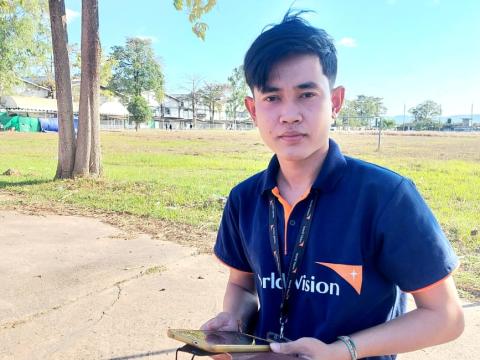24 hours in the shoes of a Quarantine Centre volunteer

“Every day, I start my service at 7:20am at the Quarantine Centre of Nonsavath, in Savannakhet Province. I wash my hands, wear a new personal protective equipment suit, put my hands in latex gloves and don’t forget my mask. This is a routine I have been practicing for over a year now.”
Uttama is one of the eight volunteers currently deployed by World Vision in the two Quarantine Centres supported by the World Food Programme. The 24-year-old man tells us what his daily life looks like since he decided to serve the vulnerable children and families stranded in their temporary shelter. All people entering the facilities need to go through a thorough process, as Uttama describes: “when people arrive at the centre and come to register, they undertake a PCR test collected by nurses and doctors for laboratory examination. Then, we guide them to the area for the newcomers, and provide them bowls, spoons, plates and cups they can reuse for every meal until they leave, so we reduce wastes. The incoming people also receive a card with a QR code to monitor if they have received their meal”. The health conditions are closely monitored, and any positive test or worsened health condition of the centres’ occupants will mean a transfer to the hospital for treatment.
On a brighter note, the temporary ‘guests’ know they will enjoy a well cooked, nutritious meal with the people accompanying them: “every day we have a detailed schedule of the food distribution for the three meals, so that the migrants know when to come and pick their food. The menu for each meal will be different. It can include fried food, soup, grilled or stewed meat, vegetables, and always fruits with a milk carton. Both sticky or steamed rice are alternated, depending on the menu,” says the volunteer. A child-focused organisation, World Vision is paying a particular attention to the nutrition of the children momentarily passing by the facilities, and tailoring its support to the specific needs of the centres’ occupants:
We order special meals for children, and also for people who have allergies and can’t eat some food, as soon as they notify us when they arrive”. To achieve the perilous mission of filling the migrants’ stomachs with tasty food, World Vision partners with local restaurants from Savannakhet and Saravane, also impacted during COVID-19 with a decline in turnover.
An estimated 35,300 individuals, including 5,000 children, have met Uttama or one of the volunteers supporting the Government of Lao PDR to welcome back Lao nationals safely. Uttama shares some personal remarks, facing the diversity of people he met: “workers have a wide range of different ideas and behaviours, sometimes they don’t understand and get mad with the protocols, but we take time to explain them and show that the process is set to improve their conditions”. He also shares his lessons learnt and the great takeaways of this experience of more than a year: “I am amazed by the commitment of the volunteers, doing their best to get the job done, whether during the peak of migrations or the calmer periods. Another impression is the generosity and solidarity between the migrants, taking care of each other, and deeply thankful for the food we provide from day 1 to the end of their stay at the Centre”.
It’s already the end of the day, as the sunset is gradually leaving the floor to the lamps and bulbs’ artificial lights of the Centre. The dinner has just been served for some 300 people currently crowding the Nonsavath Centre. Tonight, it is chicken fried rice in their plate. While the children and adults are enjoying their meal, it is time for Uttama to dispose of his clothes of the day and drive back home. He knows his task has been completed today, and he knows more is to be done tomorrow, with familiar faces replaced by new ones.